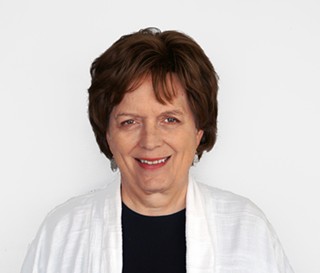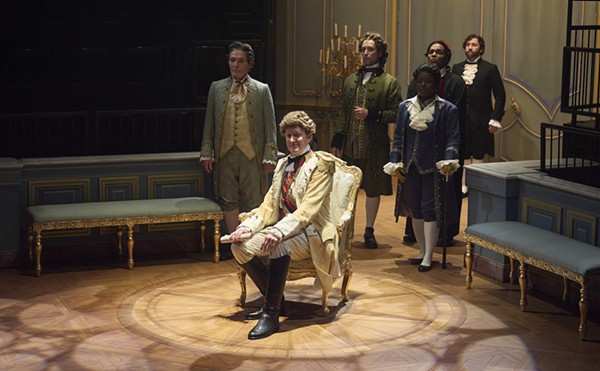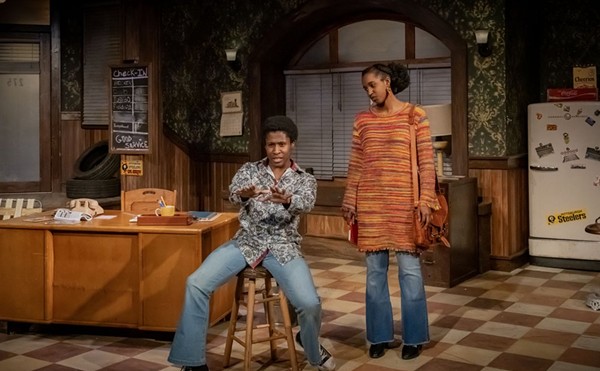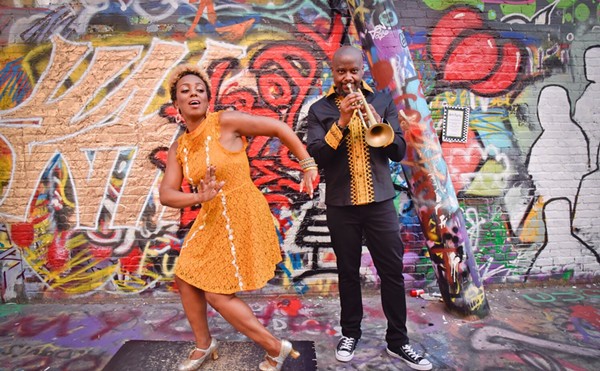Even though last Sunday's Oscar ceremony displayed a record number of wins by black stars, along with a nod to black screenwriters (with Moonlight winning Best Picture and Best Adapted Screenplay), there are still diversity issues in Hollywood. And that's why it's good timing for Barbecue, now at Cleveland Public Theatre.
This play, which starts out as a shameless and sometimes uncomfortably condescending immersion in the follies and addictions of lower class families, eventually turns into a commentary on race and the arts, movies in particular. And due to the surprising and witty structure of the play, this review will not reveal all the turns this tale actually takes.
At the start, we see the white trash O'Mallery family getting ready for a party in a crummy park, with beer-swilling James T holding down a picnic bench "at the ass crack of dawn." Eventually his family members straggle in as Marie and Adlean and Lillie Anne start setting up the picnic and some sad decorations strung on a chain link fence. It turns out they're lying in wait for one more of their kin, Barbara.
The familial relationships among these folks are much less important than the fact that they all share a fondness for alcohol, drugs and cussing a blue streak. And as messed up as the first four are, the one they're waiting for is the real train wreck. They refer to volatile Barbara as "Zippity Boom" because that's how she acts when she drinks and does drugs — she soars up high and then explodes. And apparently, it ain't pretty.
So they've come to this park for an intervention, to talk to Babs about her vile, addictive behavior and send her off to rehab in Alaska. Some of them are sure she will never agree to such a plan, since she loves her "Jack and crack" way too much.
Just as we're settling into watching this family curse at each other, with James T threatening to use a taser on one or all of them, there's a blackout. And then there's a ... black-in (trademark pending). When the lights come up, all the characters are in the exact position they were a few seconds ago, wearing the same clothes, but now they're all black. And these five new actors continue the scene without missing a beat, adopting the identical character attitudes we've come to recognize.
During the first act, that switcheroo happens a couple more times and you think, oh sure, I get it. Cute gimmick, white and black families are similar, or even identical, yadda-yadda. But no, you don't get it. And that becomes clear at the end of the first act, when a stunning twist occurs that pretty much tops any first act closer I've ever seen.
In the second act, playwright O'Hara switches from a cavalcade of operatic obscenities into an entirely new gear, as the two Barbaras confront each other in a way you probably won't see coming. And that ultimately leads to the stage at the Oscar ceremonies.
Just from that faint sketch, you can see that Barbecue has a lot on its mind, dealing with a galaxy of issues including race, addiction, the entertainment industry, truth in media, co-opting and profiting from cultural stereotypes, and "titty cancer." And in the hands of O'Hara, who is one of the most promising young black playwrights on the scene today, it is steadily amusing and constantly surprising.
The 10-person cast works smoothly together under the sure-handed direction of Beth Wood. Some of the characters have more material to work with than others, such as Ray McNiece playing white James T. He opens the play with a profane monolog that nicely sets the stage for what's to come. And the whiskey-swilling Maries, both black and white versions, are well-crafted by Ashley Aquilla and Sally Groth respectively.
It isn't until the second act that we really see the Barbaras, as they face off. Jill Levin as the white Barbara looks extremely fierce at the end of the first act, but we never see her actually go "Zippity Boom," and that's a disappointment. She is somewhat subdued in the second act as she tries to figure out black Barbara, played by Katrice Monee Headd. A fine actor, Headd does a respectable job with her out-of-the-box character, but she doesn't take enough chances with a role that could be far more hilarious and disturbing.
Ultimately, Barbecue is a satire that wants to grill many over its flames. The play seems to be inspired, in part, by the literary scandal involving James Frey and his book A Million Little Pieces, which was a "memoir" that turned out to be fictional. Barbecue is a bold, risk-taking venture, and hooray for that! And even with an ending that feels too pat and self-congratulatory, this is a show that will keep you laughing, intellectually involved (eventually), shocked and guessing.












